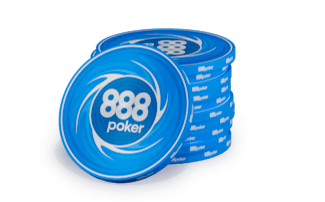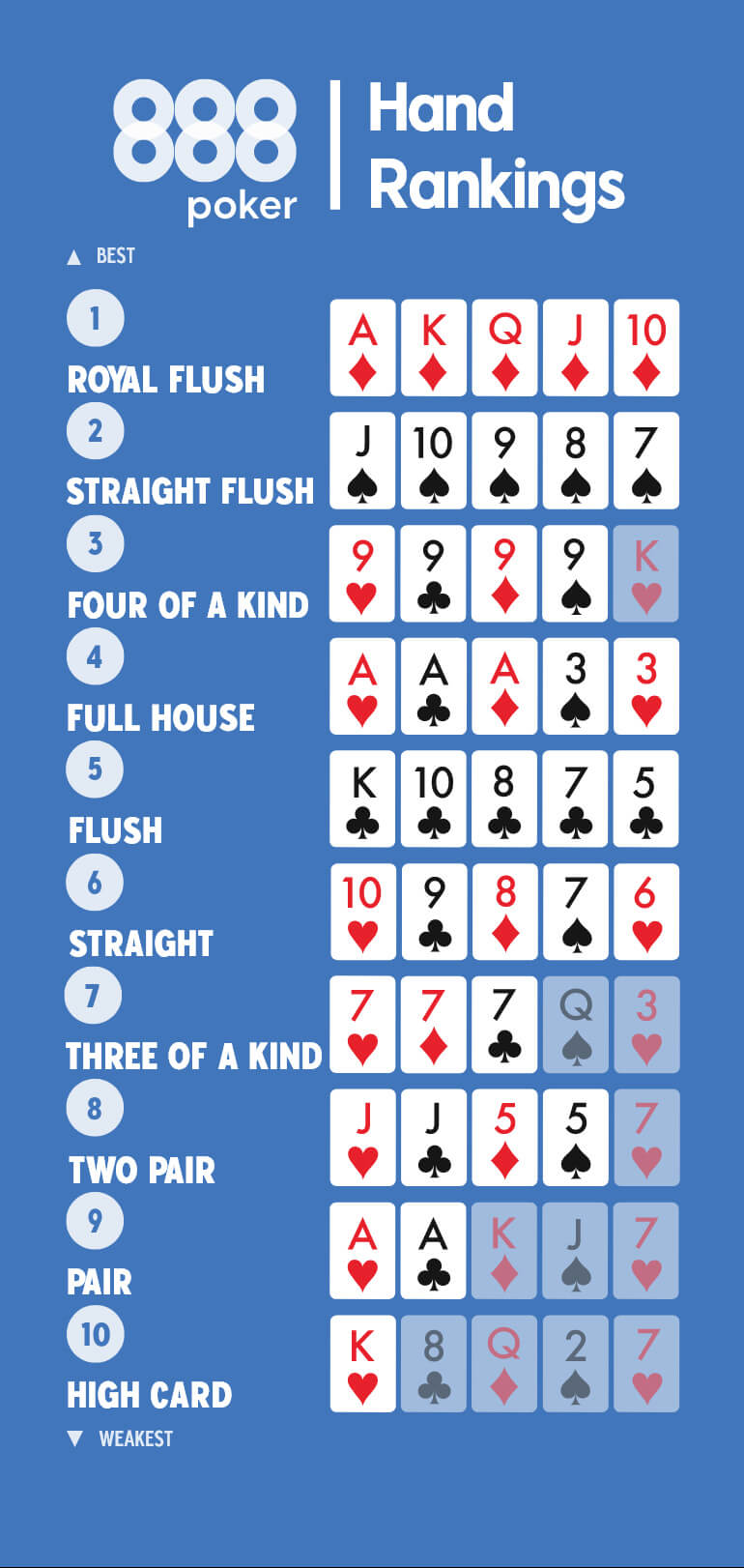There are several different variations on the core game of poker. We’ll get into these different poker types later, but each shares a number of common threads.
The main objective of poker is to use the cards you’re dealt to create the best five-card hand possible – or to convince other players that you have the best hand, even if you don’t!
Poker Hand rankings guide
The cards in a deck are individually ranked, from top to bottom:
A, K, Q, J, 10, 9, 8, 7, 6, 5, 4, 3, and 2.
When you’re creating your best hand of five cards, you’re usually looking to make a:
…in order of strongest to weakest. Usually, the higher the value of the cards in that hand, the stronger it is. For example, a pair of Aces beats a pair of Queens, and a straight that runs 7-8-9-10-J beats one that runs 5-6-7-8-9.
Check out our full guide to poker card rankings and hands to find out how to make the most of the cards you’re dealt.
Although you’ll usually stay at the same seat at the table, the position you’re in when it comes to poker’s order of play changes with every hand, relative to who’s dealing the cards.
When there’s a non-playing poker dealer, a Button is used to indicate your position for each hand, with play proceeding left-to-right around the table.
- If the ‘action’ – or order of play – starts with you, then you’re in Early Position.
- If it comes to you last, then you’re in what is known as Late Position.
- If you’re somewhere in between the two, you’re in Middle Position.
Poker positions affect betting strategy for various reasons. You might be entering a stake (known as a ‘blind’ bet) before you’ve even seen your cards.
If you’re the first to act, you have less information as to how ‘strong’ your opponents are, and might get raised or re-raised. If you’re the last to act, you have more information – and might even be able to ‘steal’ those blind bets with a cheeky raise, if everyone else has folded.
As you learn poker skills, you’ll understand that position can be a big factor in determining how often a certain hand or player will win.
Be sure to bookmark our guide on to find out exactly where you stand (or sit, in this case!).
Texas Hold’em in 8 Simple Steps – How Each Hand Unfolds
Here’s our quick and easy 8-step rundown for understanding how things proceed in Texas Holdem – arguably the most popular type of poker. How the action plays out, however, is up to you and your opponents!
- The dealer shuffles the deck, then distributes cards to all of the seated players.
- Once the cards have been dealt, it’s time for the pre-flop. Here you can fold, call, raise or even re-raise, depending on what you’ve got.
- The flop is when the first three community cards are shown. It’s the first time you can think about building your full hand, so if you don’t have much to start from at this point it might be the best time to fold.
- The turn comes with the ‘turn’ of the 4th community card. As before, you can check, call, fold or raise. Now your position and early signs of the direction of the hand are made clear, you can think about how your full hand might look.
- The river is the reveal of the fifth and final community card. Now you know what you’re (Texas) holding, you can make a far more confident bet based on the situation – or just bluff!
- Post-river marks the end of the hand. Now, it’s time to use your hole cards in conjunction with some of the community cards to build your best hand.
- If you’re still in for the showdown, it’s time to call out your remaining opponents – or be called out yourself to reveal your hand.
- The best hand wins the pot – usually! Bluffing can be your best friend – or your worst enemy – when it’s time to lay down your cards.
Some games such as Omaha follow a very similar poker order to Hold’em.
New to Poker? Start with the Basics
If you’re completely new to this exciting game, we’re here to help. Check out our advice and learn some poker basics, before moving onto more advanced guides.
What Is Poker? A Game of Skill, Luck, and Bluffing
Poker is a catch-all name for a classic group of card games where you usually aim to make the best five-card hand – and bet that the value of the cards you hold is stronger than your opponents. Alternatively, you can try to bluff your way to victory!
Although playing poker and winning can involve a slice of luck, there’s also great skill in being able to outfox other players through strategy and how/when you bet.
How a Poker Hand Works: From Betting to Showdown
- The aim is usually to have the strongest five-card hand, or convince others that you have it.
- When the ‘action’ is on you in each round, you can make a bet, call or raise any existing bets, or choose to fold (sliding your cards away face-down, and taking no further part in that hand).
- When it’s your turn to bet, you can fold at any time.
- If more than one player stays in until the final betting round is over, there is a ‘showdown’ – where these players reveal their cards. The winner is the player with the strongest hand.
- If everyone else folds their cards when you bet or raise the stakes, even if you haven’t reached the ‘showdown’, you win that hand. This is where the thrill of ‘bluffing’ comes in, as a clever player can act as though they have better cards than they actually do.
Read our more in-depth guide to the rules of poker – including the rankings of poker hands.
Understanding Poker Betting – Actions, Rounds, and Strategy
Betting in poker is all about having the confidence that you’ll build a winning hand, already have one, or haven’t – but are willing to try a bluff!
Poker betting works in rounds, allowing you to assess your hand against the possible cards your opponents hold, or are building.
When it’s your turn to bet, you can usually do one of the following things:
- Check – until the first bet is made that round, you have the option to ‘check’. This means you pass up the chance to bet until the action is back on you.
- Open – this is the first bet made during the round, and each subsequent action is made in response to the opening bet.
- Fold – you can choose to fold your hand, if staying in seems too steep, though you’ll lose anything you’ve already put into the pot.
- Call – you can choose to match the highest bet made at the table so far.
- Raise – you can increase the previous high bet. A ‘check-raise’ is when the same player checks and then raises in a round. Raising a raise, meanwhile, is known as a ‘re-raise’.
Players usually announce what they’re doing out loud, although there are non-verbal ways to confirm what you’re doing.
Tapping the table can mean that you ‘check’, while giving up your cards to the dealer face-down without saying anything essentially means you fold.
When you’re betting you should place or slide your chips forward in front of you for the other players and dealer to confirm the amount. The dealer will then add them to the pot.
Poker Betting Etiquette and Rules You Should Know
When it comes to how you bet in poker, understanding that some things are frowned upon can sometimes be helpful.
‘Seeing and raising’ is an act you see in many movies and TV shows, where someone announces they will call the previous bet, and then announces they will also raise. This is not allowed at most tables, because bets should generally be announced in one go or placed in one movement.
Making more than one move, or ‘string-betting’ when it comes to putting chips in the middle, is frowned upon – because it gives you two chances to determine opponents’ reactions and their next course of action.
The amounts you can bet are also determined by whether the game is fixed limit, no-limit or pot-limit. This can affect the way you bet strategically in games.
You also need to be clear on whether or not your raise includes the original bet. Are you raising by an amount or raising to an amount?
Find out more about poker betting - and bluffing - with our comprehensive guide.
Poker Etiquette: Unwritten Rules for a Fair Game
While some table rules aren’t set in stone, there’s a certain code of poker etiquette which helps games run smoothly and allows everyone – no matter their experience level – to enjoy the action.
- Don’t play out of turn. Declaring that you’re going to bet or fold before it’s your turn can have an unfair influence over how others will play before the action gets to you. It’s best to avoid this.
- Be clear on your betting. Try not to confuse fellow players with how many chips you’re betting, or hide how you’re doing by obscuring your chip stack.
- Avoid interfering. If you’re out of the round, it’s best not to tell players what you’d do in their situation, for example. Watching and learning is usually the way to go.
These are just a few examples - find out more about the unwritten rules of poker etiquette.
How to deal in poker
Poker games at casinos usually have a designated dealer. But if you’re dipping your toes into the world of poker on a casual basis with friends, you might be expected to take your turn dealing cards and managing the chips in the middle (known as ‘the pot’).
There’s no particular secret to being a good poker dealer, but here are a few quick tips to get you started:
- Shuffle the cards really well between each hand.
- When dealing the Flop, Turn and River, it is usually good practice to ‘burn’ the top card by putting it face down on the table, and out of play. It’s a good idea to check with the other players beforehand if they prefer to do this.
- Starting with the player to the left of the Button, deal a card at a time to players around the table, until everyone has their starting cards.
- Different poker types have different numbers of starting, or ‘hole’ cards, to deal. In Texas Hold’em, it’s two. In Omaha, it’s four.
- Take the bets and manage the chips in the pot. It’s usually the dealer’s responsibility to ensure bets are being placed properly, but ask for help if you’re new – and a more experienced player can usually show you how.
- The dealer usually announces which hand is highest at the end, or names the player left in after all other players have folded, then pushes the pot of chips to the winner. Again, just ask your fellow players for help if you’re new to this, and watch others to see how they do it before having a go yourself.
Get more information about how to deal in poker with our in-depth guide. If you’re thinking about taking your skills to the professional stage, we even have one on how you can make those dreams a reality.
Want more poker tips for beginners?
Now you’re a little more familiar with the basic poker rules, it’s time to build on your knowledge. At 888poker we have tons of guides on getting to know the game, inside and out. From cool strategies to learning all the right lingo, we can help you develop your game – and have even more fun while doing it.
Types of Poker
There are many different types of poker game, each with their own unique characteristics and rules that add to the enjoyment each time. Here’s an introduction to the most popular types, and what to look out for when you’re playing.
Before you can learn how to play Texas Hold’em like the pros, you should know the basics.
- Players are dealt two ‘hole cards’
- Up to five ‘Community cards’ are dealt into the middle
- Players make their strongest five-card hand using both their private hole cards and the shared community cards (which anyone can use)
- Players get four ‘hole cards’
- There are five community cards in the middle
- Your hand is made of two hole cards, plus three community cards.
- Having more hole cards means more powerhouse hands are possible, and things like ‘aces high’ are much less likely to win a pot.
Check out our guide to Omaha Hi and enjoy this fun spin on the poker experience.
- This typically fixed-limit game is also known as Omaha 8 or better
- The pot is split 50/50 at the end of each hand
- Half goes to the hand with the highest value cards
- The other half goes to the hand with the lowest value!
The fun of Omaha Hi-Lo comes from devising the best strategy to take both pots. Learn more today with our 8-step guide.
Other poker types
Five-card stud is a classic form of the game, while more obscure but especially fascinating poker options include Badugi, Horse and Razz.
Check out our guide to popular poker variants if you’re keen to try something a little bit different.
How to Play Poker Online
Online poker has its differences to the live, in-person experience, but is every bit as exciting – and offers prospective poker masters an even more convenient way to play.
To get started, simply sign up with an online poker site such as 888, then choose your stakes and join a virtual table.
Key differences between online poker and live poker play
- Speed of the game. When you’re playing online, manual actions like shuffling and dealing are done almost instantaneously, meaning that the game usually progresses more quickly.
- 24/7 convenience. When you want to play online poker, you’ll almost always be sure of a seat at the virtual table. Whether you’re relaxing in the afternoon or looking for a game at night, online cash games and tournaments are usually available around the clock.
- In-person play vs online play. One of the most interesting things about playing in person is being able to ‘read’ your opponents’ style of play – everything from how they bet to whether they have a ‘tell’ that you can use to your advantage. Although online poker doesn’t allow you to read people in person, you might still be able to work out their betting strategies and habits if you pay attention.
- Socialising with players. Poker rooms online have a chat function which allows you to chat with other players, just as you would during a live poker game.
Variety of online poker games
As well as all the usual poker games on offer, you’ll find exclusive tweaks to the traditional formats with online play.
- Sit n Go poker is usually the fastest type out there. There’s no scheduled start time; play begins as soon as enough players have claimed their place at the table. An SNG game can take only an hour – sometimes even less.
- Multi-table tournaments allow you to play as part of a large field of entrants, competing for a share of the total prize pool. This format means that even relatively small stakes can give you a shot at some serious money.
- Cash games differ from tournament games in that the chips you’re playing with represent the amount of cash you’ve bought in for. In organised tournament games, each player has the same number of chips to begin with.
If you’re new to online poker, why not check out our top online poker tips for beginners?
You can also play poker for free to practice your newfound skills, before you’re ready to play for real money.
Play Poker Online with Friends – Set Up Private Games
Many poker sites will actually let you set up and play private games with your friends. Even if you can’t all meet up in the same place, you can still sign up for a private poker room online and catch up with friends while you play. Find out more.
FAQs
Can you play poker with two people?
Yes! This is known as ‘heads-up poker’, and is used for a specific game with two players, or a situation where two players remain at the final table of a tournament. There’s no reason why you can’t enjoy the poker playing experience with only one other player. Find out more about heads-up poker and how you can make the most of a ‘two-handed’ game.
What is the highest hand in poker?
The highest hand you can get is a Royal Flush – which consists of 10-J-Q-K-A, all of the same suit. As the highest-possible Straight Flush, combining the highest straight hand (including the face cards) with the highest five cards of the same suit, it reigns supreme when it comes to all possible poker hands.
What does muck mean in poker?
‘Muck’ refers to the pile of cards which players have discarded in a given hand of poker. The dealer usually adds to this between each round of betting when they ‘burn’ off the top card of the deck. Players are also said to ‘muck’ their cards, or ‘toss them into the muck’, if they fold without having to show them.
What is the ante in poker?
The ante is a small bet that each player places before the round begins proper. The word ‘ante’ is Latin for ‘before’. In Hold’em, Blind bets placed by two players in each round usually replace the ante.
What is a small blind in poker?
The player directly to the left of the dealer Button in each round assumes the position of the ‘Small Blind’. Two Blind players place bets before they’ve seen their cards (hence being ‘blind’ to what they have). This is to start the ball rolling on bets. The player to the left of the Small Blind places a larger bet – often twice as much – known as the ‘Big Blind’.
How many poker chips do you start with?
This depends on whether you’re playing a tournament game or a cash game. In a tournament game, every player receives the same amount of starting chips – though there may be options to ‘top-up’ or buy back in at certain points. With cash games, you get the chips that directly represent the value you’ve bought in for, which may be more or less than your opponents. Many tables will have a minimum or maximum buy-in, however.
Is one suit higher than another in poker?
No. Unlike other card games such as contract bridge or Ninety-Nine, all suits are considered equal when the cards are down. Poker focuses on the rank of each card – a high straight beats a lower one, for example.
What is a wraparound straight?
A wraparound straight is a run of cards which starts high, goes through the Ace, and finishes low, or vice versa. For example, a Q-K-A-2-3 is a wraparound straight. It’s important to be aware, when learning how to play poker, that a wraparound straight doesn’t actually count as a hand in most poker games. Your hand here would be an Ace-King high, for example, which wouldn’t even beat a pair.
However, wraparound straight draws are important in Omaha-based games, while some obscure variants of poker may allow wraparounds as a hand. Find out more about wraparound straights.



